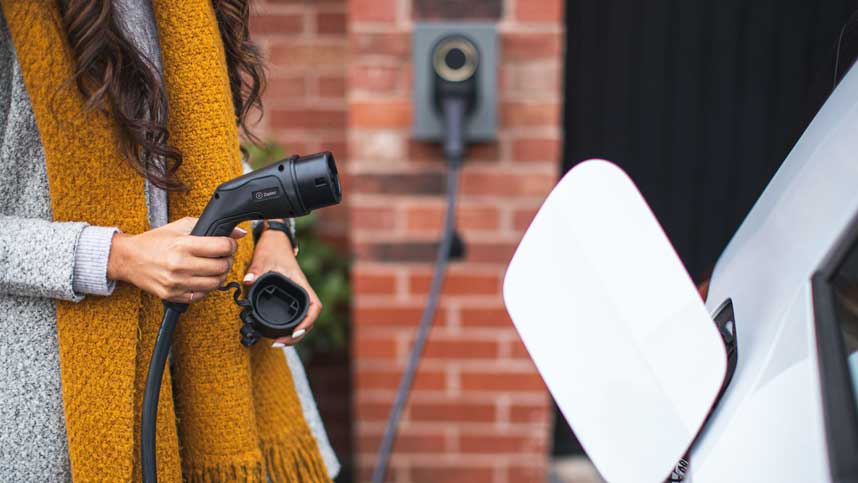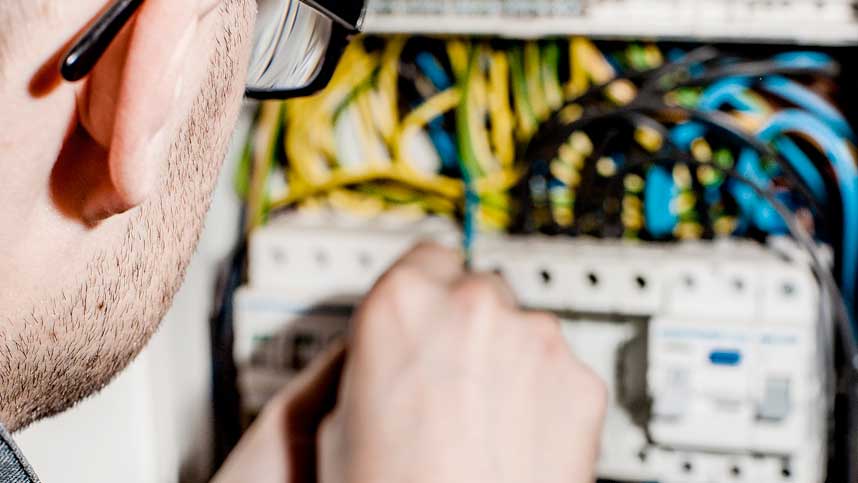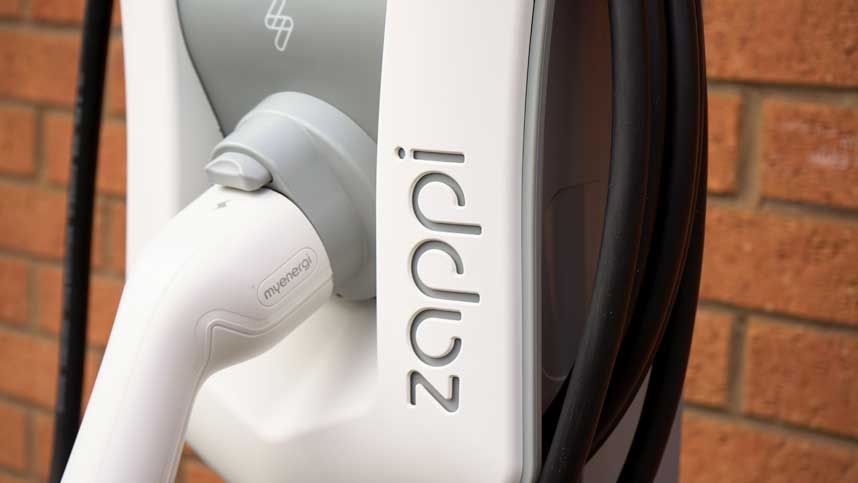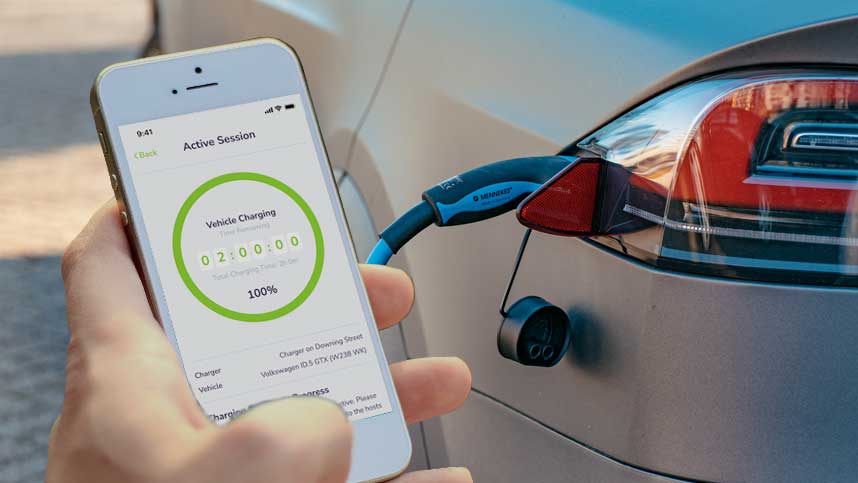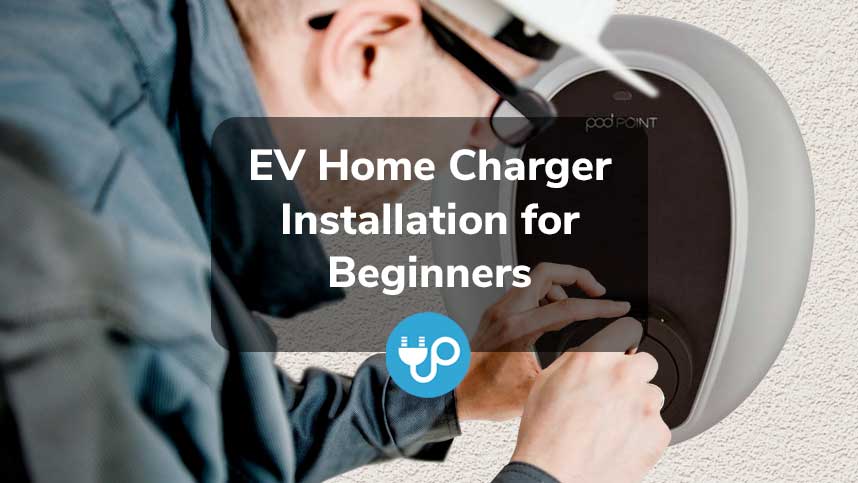
EV Home Charger Installation for Beginners
EV home charging is the process of recharging an electric vehicle's battery using a charge point installed in a residential setting, such as in a garage or on a driveway.
This is in contrast to charging an EV at a public charging station or using a rapid charging station whilst out on the road.
EV home charging typically involves plugging the vehicle into a home charging unit (also known as a wall box), which is connected directly to the premises’ electrical system.
The charging unit is then connected to the vehicle's charging port, and the charging process begins.
In this article, we’re going to explain how EV home charging works, the process of getting an EV charger installed at home, and how to find a suitable qualified contractor.
Chapters
How Does EV Home Charging Work?
EV home charging enables electric vehicle owners (EVO’s) to charge their cars at home using a dedicated charging unit.
The charging process typically involves plugging the EV charging cable into the car's charging socket at one end, and the charging unit's outlet at the other, unless the cable is tethered.
Most if not all residential charge points in the UK use a 32 amp, 3-phase electricity supply, which provides up to 7.4kWh of electricity.
A home EV charger must be installed by a fully qualified electrician.
Once installed, EV owners can use a smartphone app to remotely set up and monitor their home charging.
They can also schedule charging sessions during off-peak hours to save money (if their electricity tariff offers lower energy costs overnight), and even receive notifications when charging is complete.
Overall, EV home charging offers a lot of convenience and flexibility of charging a car at home while also providing significant cost savings compared to public charging stations, or driving a car with an internal combustion engine that requires fuel.
What’s the Process of Getting an EV Home Charger Installed?
The process of installing an EV home charger is easy.
It typically involves the following steps:
Site Survey
Before the installation, a local qualified electrician or a representative from an EV chargepoint manufacturer will conduct a site survey to assess the condition of your electrical system and determine the best location for the charger.
They will then provide a quote, with possible pricing options depending on the make and model of chargepoint on offer.
For example, if you have solar panels already installed at your home, you may be able to take advantage of the energy they produce to power the EV charger, thus saving money when charging your vehicle.
Installation
Once you’ve agreed on a suitable charging unit and a price for the work, the next step is to have the charging unit installed.
The electrician will need to install a dedicated circuit and potentially upgrade the consumer unit to ensure that it can handle the additional load.
The installation typically takes a few hours, and no more than half a day’s work.
Testing
Once the installation is complete, the electrician will perform various tests to ensure the charging unit is functioning correctly and safely.
They will also provide you with a certificate of completion.
Registration
The final steps are to register the charging unit with the manufacturer to activate the warranty, as well as your electricity provider who may offer a special electricity tariff for EV owners.
It's important to note that the installation process may vary depending on a number of factors.
These can include the type of charging unit required, the home’s electrical system, whether you want the charger integrated with an existing solar PV or any potential regulations outlined by the local authority.
It's recommended you only work with a OZEV qualified electrician or charger manufacturer to ensure that the installation is done safely and efficiently.
How Much Does an EV Home Charger Installation Cost?
The cost to install an EV home charger can vary depending on a number of factors.
This includes the make and model of charger you choose, the complexity of the installation, and where you live in the country.
Here are some rough estimates to give you an idea of how much you can expect to spend:
Fast Chargers
A 7kW chargepoint can cost anywhere from £500 to £1,000 for the unit, plus £400 to £800 for installation.
Most UK residential homes will have a 7kW unit installed, so this is most likely the type of system you will be offered.
Rapid Chargers
In some rare instances, your home may have a 3-phase electricity supply, meaning you can install a rapid home EV charger offering much faster charging speeds.
A 22 kW and above charger is however much more expensive to install.
You can expect to pay around £1,000 to £2,000 for the unit, plus £800 to £1,200 for installation.
Please note that these estimates are just a rough guide, and the final cost of your EV home charger installation will depend on a variety of factors.
Additionally, there may be UK government grants or incentives available that could help offset the cost of installation.
It's a good idea to get several quotes from local OZEV approved EV charger installers to find the best deal for your specific needs.
What are the Most Popular Brands of Home EV Chargers?
There are several brands of home EV chargers available on the market in the UK.
Some of the most popular manufacturers include:
Pod Point
Pod Point is one of the largest and longest established EV home charger companies in the UK.
They offer a wide range of home charging units, from fast chargers to rapid chargers.
EO
EO is a UK-based manufacturer of EV chargers.
They offer a range of home charging units that are compatible with a variety of different vehicles.
MyEnergi
MyEnergi is one of the more recent companies to emerge in the UK’s electric vehicle charging market.
The brand has quickly become popular due to their innovative Zappi charging unit, which can intelligently manage charging based on the availability of renewable energy sources.
Andersen
Andersen is a UK-based manufacturer of premium EV chargers.
They offer a range of stylish and customizable charging units that are designed to complement the aesthetics of your home.
Rolec
Rolec is another established UK-based EV charging company.
They offer a range of home charging units that are designed to be affordable and easy to use.
The above is just a small selection from a wide range of very reputable EV charger brands.
There are many other brands of EV home chargers available in the UK, so the best one for you may depend on your specific needs and budget.
It's a good idea to do some research beforehand, or alternatively, speak to an expert such as an OZEV qualified EV charger installation professional before making a decision on which type is best for you.
How Fast Can You Charge an EV at Home?
As a general rule of thumb, most EV’s can take anywhere from 6 to 10 hours to charge from 20% to 80% using a standard 7kWh output charger.
However, the speed at which you can charge an EV at home depends on several factors.
This includes the type of charging equipment you have, the capacity of your EV's battery, and the charging rate that your EV can accept.
It's also worth noting that charging time can also be affected by other factors.
This includes the temperature of the battery, the current charge level of the battery, and the age and condition of the battery.
Additionally, the charging rate may be limited by the capacity of your home's electricity supply.
So it's important to have your electrical system inspected by an OZEV qualified electrician before installing a home charger.
How Often Should You Charge an EV at Home?
The frequency at which you should charge your EV at home depends on a number of factors.
This includes your driving habits, the EV battery capacity, and the local charging infrastructure available to you.
Here are some general guidelines to follow:
Charge When You Can
Unlike conventional petrol and diesel cars, you shouldn’t wait until your EV's battery is nearly empty before recharging.
In fact, it's often recommended that you charge your EVas often as needed.
This is sometimes referred to as ‘top up’ charging or destination charging.
Even if it's just a quick charge, this ensures you always have enough range for the next stage of your journey.
Top Up Daily
Many EV owners (EVO’s) find it convenient to top up their battery on a daily basis.
This ensures that the battery is always at maximum and ready to go when you need it.
This can significantly help prevent range anxiety, and means you can head off on longer journeys at a moment’s notice.
Charge When Range is Low
If you have a long journey planned, it's a good idea to charge your EV to a higher level before setting off, most probably 100%.
This will give you a larger amount of range to drive with, which is particularly important if you plan to drive in cold weather or at high speeds.
Avoid Battery Discharges
It's recommended that you avoid frequent full battery discharges, as this can reduce the battery’s overall lifespan.
Instead, try to maintain the battery at a moderate state of charge between 20% to 80%.
In summary, the frequency with which you should charge your EV at home depends on your specific needs and driving habits.
However, charging your EV frequently and avoiding full discharges can help ensure the battery lasts for many years of driving pleasure.
How to Get an EV Charger Installed at Home?
To get an EV charger installed at home, follow these general steps:
Research Charging Units
It's important to select a unit that is compatible with your car and meets your specific needs.
The best way to do this is to research the best units that are compatible with your EV.
Find a Qualified Installer
Once you’ve selected the ideal charging unit, you can start to look for an installation company in your area.
The easiest and quickest way to do this is by using the Joosup directory of nationwide OZEV approved EV charger installers.
Simply enter your postcode into the search field and our system will show you a selection of installers nearest to your location.
Contact Installers for a Survey & Quote
Contact a few companies to get quotes for the installation of your EV charge point.
Be sure to ask about the cost of the unit, the installation cost, plus any additional fees and warranty periods.
Government Grants
In the UK, the government offers grants for the installation of home electric vehicle charging points through both the Electric Vehicle Homecharge Scheme (EVHS), and the Workplace Charging Scheme (WCS).
Find out if you are eligible for one or more of these grants, as they can significantly reduce the cost of installation.
Book an Installation
Once you’ve selected an installation company and received a quote you’re happy with, you can schedule the installation.
Usually, the installation company will need to visit your home to survey the existing electrical system in your home and the best location for the charging point.
Installation & Testing
Once the installation is done, the contractor will test the charge point to ensure it’s operating normally.
You will then be able to start using the charge point to ensure your EV’s fully charged.
As previously noted, it's important to work with an OZEV qualified electrician to ensure your charge point is installed to correct safety standards.
Additionally, be sure to read the manufacturer's instructions and safety guidelines for your charging unit before use.
Conclusion
As you will have discovered, getting an EV charger installed at home is not as daunting as it may at first seem.
Understandably, many people are hesitant about going green and buying an electric car, as the decision represents a lot of change.
But with a little research and some conversations with qualified professionalis, you'll soon realise that driving an electric car is a very simple, stress-free switch.
Better still, the convenience of charging at home is also a massive plus point.
Blog Archive
- Where Can I Charge My Electric Car?
- Electric Car Maintenance and Servicing Guide
- How Often Should I Charge My Electric Car?
- How to Check EV Battery Health
- Do Electric Cars Pay Road Tax?
- October 2024 Budget: Key EV News
- EV vs ICE – Which is Best?
- Should I Charge My EV to 80 or 90 or 100%?
- UK Government Announces Hybrid Sales Allowed Until 2035
- BEV vs PHEV – What’s the Difference?
- Definitely Not A Guru (Jim Starling) Reviews Joosup
- How Long Do Electric Car Batteries Last?
- 25 New Electric Car Brands on UK Roads
- General Election 2024: Major Party Net Zero Policies Compared
- Electric Car Service Costs vs ICE
- CHAdeMO vs CCS – What’s the Difference?
- Mr EV Reviews Joosup
- What is the ZEV Mandate?
- Spring 2024 Budget: No VAT Rate Cut on Public EV Charging
- What is Regenerative Braking?

